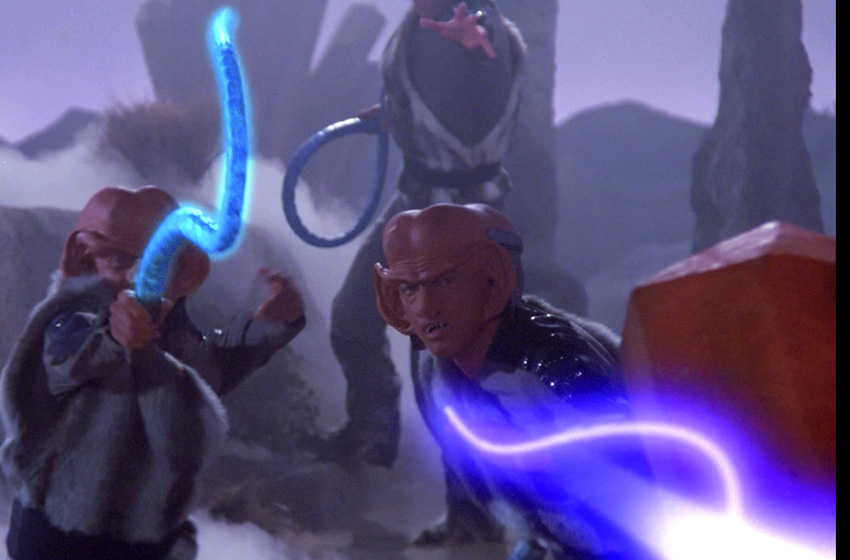We
literally saw the Cardassians overthrow a military dictatorship and replace it with civilian rule
during the run of the show.
Is it a break with most of Cardassian history and the dominant cultural system? Yes. It is also a
motivated break. If it is an inconsistency -- which I don't think it is, because, again, the show made it clear that there was a major dissident movement on Cardassia -- then it was a motivated inconsistency, a deliberate choice on the part of the Cardassians to reject a culture that had brought them to the brink of extinction.
It's also consistent with the canon. Remember Garak's final scene?
From
"What You Leave Behind, Part II:"
BASHIR: Eight hundred million dead.
GARAK: And casualty reports still coming in. Well, aren't you going to congratulate me, Doctor? My exile is now officially over. I've returned home. Or rather, to what's left of it.
BASHIR: Listen, I know that this must seem bleak
GARAK: Some may say that we've gotten just what we deserved. After all, we're not entirely innocent, are we? And I'm not just speaking of the Bajoran occupation. No, our whole history is one of arrogant aggression. We've collaborated with the Dominion, betrayed the entire Alpha Quadrant. Oh, no, no. There's no doubt about it. We're guilty as charged.
BASHIR: You and I both know that the Cardassians are a strong people. They'll survive. Cardassia will survive.
GARAK: Please, Doctor. Spare me your insufferable Federation optimism. Of course it will survive, but as not the Cardassia I
knew.
"Not as the Cardassia
I knew." The canon made it clear: Cardassia was going to change. It
had to; the old ways had brought it nothing but death.
Their highest literature under the military dictatorship and the censorship of the Obsidian Order. Not a very representative sample of what Cardassians
really think.
The dissident movement came out of the shadows once the Obsidian Order was gone and gained enough power to overthrow the military dictatorship.
Why? That's what life is like in most authoritarian states. Hell, it's what it's like in the authoritarian state called the United States of America.
You don't think a man can change? If being sent into exile by your own father, being coerced into torturing your friends by said father only to see him spectacularly fail, watching your home planet succumb to foreign subjugation in the name of making it "strong" again, and then watching your world and its people nearly be annihilated by the people who promised them greatness -- if that's not enough to make someone change, what do you think
can motivate someone to change?
In any event, the world's foremost expert on Garak, the actor who played him, Andrew J. Robinson, disagrees with you. He was the one who set the ball rolling on Garak becoming a Cardassian democrat in his novel
A Stitch in Time, which is essentially the autobiography of Elim Garak as told to Dr. Bashir in a letter.
Strongly disagree there. DS9 spent
years showing that Cardassia was a deeply divided culture with a military dictatorship just barely holding on and then losing power within six months of losing their secret police. This kind of thing was bubbling under the surface of Cardassian culture for years, same way the Revolutions of 1989 were bubbling under the surface of the Soviet bloc nations for years.
First off, again, the dictatorship just led them all to ruin. They know that. Why would they vote for the people who got half of their loved ones killed?
And what makes you think the Federation would allow that if they did? Cardassia may be establishing a democracy, but they're also under Federation occupation. There are, of course, parallels from real history; the United States didn't just let West Germany and Japan elect strongman nationalists after World War II.
Exactly.



